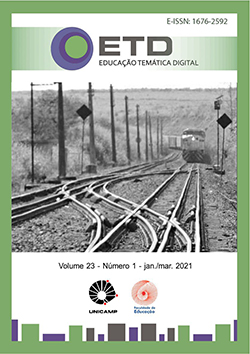Abstract
The use of technologies in learning must consider the specificity the knowledge area and then propose a demand for its pedagogical use (SHULMAN, 1986, 1987; KOEHLER; MISHRA, 2005; 2008; OLIVEIRA; PICONEZ, 2016). In distance education, the processes, methodologies, and contents are usually quite standardized, due to production time and costs. This paper aims to identify best pedagogical practices in the distance education, considering a vision of teachers, students and tutors. For that, an institutional research is being developed at a virtual public university in the State of São Paulo, Brazil, which proposes the development of a model of course considering the specificities of each knowledge area, based on the Capes table. Thus, after the organization of the courses offered at the institution according to the areas of knowledge, focus groups and questionnaires were applied with the university public, in order to survey the pedagogical practices most appropriate to each area. For each area of knowledge, a set of pedagogical practices will be proposed, and it is expected that a new definition of the supply model of courses, with the participation of the entire academic community, will generate possibilities according to the pedagogical model adopted and also will serve as parameter to other institutions, as well as promoting the improvement of the internal organization for the students learning process.
References
BAUMGARTNER, Karin. Strategies for hybrid course design in second-year German. Die Unterrichtspraxis / Teaching German, v. 48, n. 2, p. 211-228, 2015.
BELLONI, Maria Luiza. Educação a distância. São Paulo: Autores Associados, 2009.
BRASIL. Decreto no 9057, de 25 de maio de 2017. Regulamenta o art. 80 da Lei no 9.394, de 20 de dezembro de 1996, que estabelece as diretrizes e bases da educação nacional. Brasília, DF: Diário Oficial da União, 26 maio 2017.
BRASIL. Ministério da Educação – MEC. (2014). Censo da Educação Superior. Brasília, 2018.
BROOKS, Michael. Developing effective undergraduate online history courses: an experiential model. Teaching History: A Journal of Methods, v. 40, n. 2, p. 73-86, 2015.
BROWN, Tim. Design thinking. Harvard Business Review, v. 86, n. 6, p. 84-92, 2008.
CRESWEL, John. W. Projeto de pesquisa: métodos qualitativo, quantitativo e misto. Porto Alegre: Artmed, 2007.
DEWEY, John. Vida e educação. 10. ed. São Paulo: Melhoramentos, 1978.
FREIRE, Paulo. Pedagogia da autonomia: saberes necessários à prática educativa. 51. ed. Rio de Janeiro: Paz e Terra, 2015.
GARBIN, Mônica C.; OLIVEIRA, Édison Trombeta. Práticas docentes na educação a distância: um olhar sobre as áreas do conhecimento. Diálogo Educacional, v. 19, n. 60, p. 36-55, 2019.
HASHEY, A. I.; STAHL, S. Making online learning accessible for students with disabilities. Teaching Exceptional Children, v. 46, n. 5, p. 70-78, 2014.
KOEHLER, Matthew; MISHRA, Punya. What happens when teachers design educational technology? The development of technological pedagogical content knowledge. Journal of Educational Computing Research, v. 32, n. 2, p. 131-152, 2005.
KOEHLER, Matthew; MISHRA, Punya. Introducing TPCK. In: AACTE. Handbook of Technological Pedagogical Content Knowledge (TPCK) for Educators. Routledge: New York and London, 2008. p. 3-30.
KUOSA, Kirsi. et al. Interactive Visualization in tools to improve learning and teaching online learning environments. International Journal of Distance Education Technologies, v. 14, n. 1, p. 1-21, jan-mar. 2016.
LÉVY, Pierre. A inteligência coletiva: por uma antropologia do ciberespaço. São Paulo: Loyola, 1999.
MOORE, Michael G.; KEARSLEY, Greg. Educação a distância: sistemas de aprendizagem on-line. 3. ed. São Paulo: Cengage Learning, 2013.
OLIVEIRA, Édison Trombeta de. EaD e ambientes virtuais de aprendizagem: dimensões Orientadoras para Seleção de Mídias. 2019. 177 p. Tese (Doutorado em Educação) – Faculdade de Educação, Universidade de São Paulo, São Paulo, 2019.
OLIVEIRA, Édison Trombeta de; PICONEZ, Stela Conceição Bertholo. Balanço da publicação acadêmica sobre TPACK no Brasil (2008-2015) e suas correlações com os estilos de aprendizagem. In: MIRANDA, L. et al. (Org.). Estilos de aprendizagem e inovações pedagógicas. Santo Tirso: White Books, 2016. p. 105-119.
PLATTNER, Hasso; MEINEL, Christoph; LEIFER, Larry. Design thinking research – Studying Co-Creation in Practice. Springer, 2011.
REYNOLDS, L. et al. Library instruction and information literacy 2015. Reference Services Review, v. 44, n. 4, p. 436-543, 2016.
SANTOS, Boaventura de Sousa. A universidade no século XXI: para uma reforma democrática e emancipatória da Universidade. 3. ed. São Paulo: Cortez, 2010.
SHNAIKAT, Khawla; ALQUDAH, Ayman. High-tech human-touch for online courses: Rules and principles for humanizing your online course. European Scientific Journal, v. 11, n. 16, p. 114-133, jun. 2015.
SHULMAN, Lee. Those who understand: knowledge growth in teaching. Educational Research, v. 15, n. 2, p. 4-14, 1986.
SHULMAN, Lee. Knowledge and teaching: foundations of the new reform. Harvard Educational Review, v. 57, n. 1, p. 1-22, 1987.
SILVERMAN, David. Interpretação de dados qualitativos: métodos para análise de entrevistas, textos e interações. 3. ed. Porto Alegre: ArtMed, 2009.
VYGOTSKY, Lev Semenovitch. A formação social da mente. São Paulo: Martins Fontes, 1984.

This work is licensed under a Creative Commons Attribution-NonCommercial-NoDerivatives 4.0 International License.
Copyright (c) 2021 ETD - Educação Temática Digital


